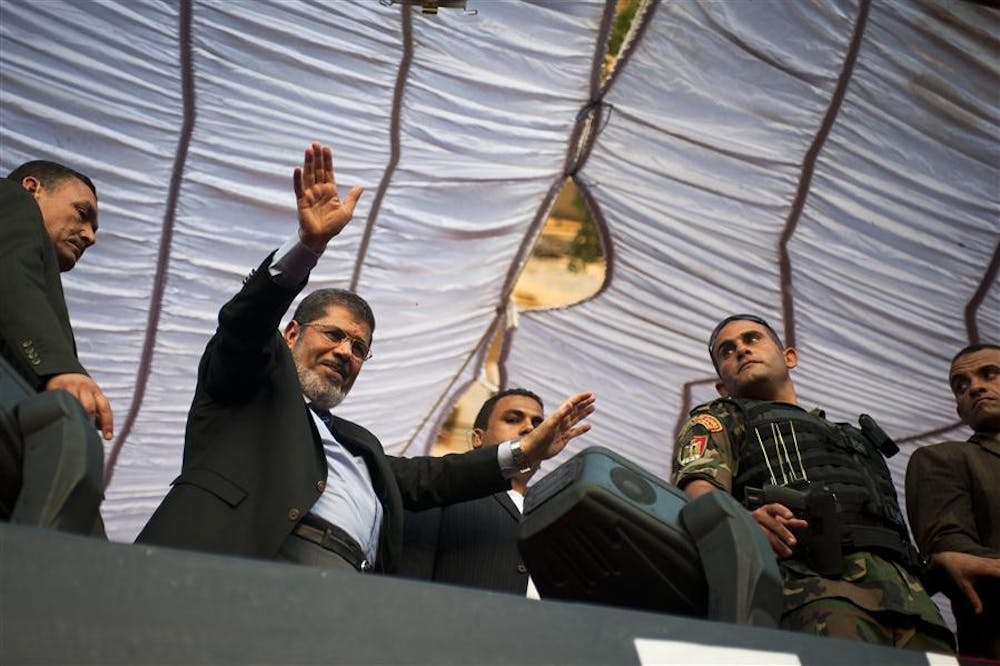I never understood how a country could become a dictatorship overnight.
I always thought there would be warning signs.
In Egypt, there weren’t.
We woke up on Thanksgiving in a democracy. By the same time Friday morning, that had changed.
On Thursday evening, Morsi passed a sweeping decree giving himself control over the legislative, judicial and executive branches. It forbids anyone to challenge him in any way.
Just like that, Egypt slid back three years, to before the revolution.
Immediately, people took to the streets. Across Egypt, Muslim Brotherhood offices were set afire by protesters. Tear gas wafted across Tahrir Square, the revolution’s center during the Arab Spring, as tens of thousands of people poured in to demand Morsi step down.
In Alexandria, dozens were injured in violent clashes. Similar violence erupted in Port Said, Suez, and at times, Cairo.
The media keeps saying that Morsi’s decree is a mixed bag. While he did assume sweeping powers akin to Mubarak, he also said he will retry those officers who injured protestors during the revolution. He extended the deadline for the constitution.
His decree made it so that the Muslim Brotherhood-dominated constitutional assembly cannot be dissolved. His timing was uncanny since at the beginning of last week, all of the secularists, Christians and minorities, walked out on the assembly because they could not support its Islamic principles.
Now, they can’t come back.
On Friday, Morsi’s Coptic Christian presidential aide Sameer Morquos resigned, stating he was not informed and did not agree with Morsi’s decree.
Egypt now has no parliament, no constitution and no way to check the power of the president.
He said his dictatorial powers are “temporary” and are necessary to “preserve the ideals of the revolution.”
Some say these are just natural aftershocks from the revolution. But this isn’t
democracy.
On the day after he received international applause for his brokering of the Hamas-Israeli ceasefire, Morsi made this decree.
He has far overstepped the rights the people gave to him. His actions are straight out of Mubarak’s playbook — or even that of Nasser and Sadat, before him.
You declare wide sweeping changes to consolidate power, but you throw in a few populist laws to appease. Those laws don’t mean anything — they’re just a carrot to try and soothe the people.
This time, the Egyptian people aren’t buying it.
Our dorm has been put on high security. Now, we must sign out every time we leave, even for five minutes, with our phone number and exact destination, in case we need to be reached immediately.
Reporters in Tahrir Square who were in it for the long-haul are saying they have not seen protests of this scale since the revolution, or the protests against SCAF, the military council who was put in power a year ago, after Mubarak fell.
The protests continue. There is a sit-in in Tahrir Square and another major protest is planned for Tuesday.
Protesters say they will sit-in until Morsi gives in.
It’s crazy to watch. As we gather in the downstairs area of our dorm and watch the protests unfold, we recognize streets. We know the names of the buildings that are on fire. One street where the main fighting is occurring is the entrance to American University’s downtown campus, where we go to school.
There’s a chance it will fizzle out. There’s a chance this will be like many other protests here, and it will lose momentum, leaving things to settle into business as usual.
Personally, I think Egyptians need to fight. I think they need to do whatever it takes to make sure that they get the democracy so many died for just in the past several years.
Morsi is not “protecting the revolution” with this decree.
He’s pulling the trigger on a second one.
— hannsmit@indiana.edu
Column: A step backward for Egypt

Get stories like this in your inbox
Subscribe





